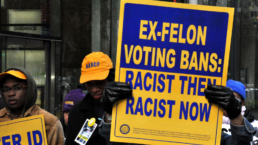Voting allows people convicted of felonies to participate in and shape their communities, helping reintegration and reducing recidivism
by Tamar Sarai, Prism
There is arguably no part of the American political process untouched by the country’s legacy of slavery and racism. Felony disenfranchisement, however, remains one of the starkest examples of how election outcomes have been shaped by anti-Blackness. In the early days of the U.S., most states had some form of disenfranchisement laws that stripped away the right to vote based on criminal convictions, but those laws were narrow and only applied to a select few offenses. It was only after the Civil War and the ratification of the 15th Amendment—which granted Black men the right to vote—that state governments expanded disenfranchisement laws to include all felonies. Legislatures sought to blunt the amendment’s impact while expanding the reach of an increasingly racially biased carceral system over Black communities.

However, a growing wave of legislation, ballot initiatives, and constitutional amendments led by coalitions committed to vote restoration have successfully pushed for felon re-enfranchisement. Additionally, public opinion is shifting as discussions around the inequities in the criminal justice system and how marginalized communities have been harmed by mass incarceration have moved further into the mainstream. Polling from 2018 found a majority of Americans on both sides of the political aisle support restoring the right to vote for formerly incarcerated people with felony convictions. But a majority of Americans still do not support voting rights restoration for those currently incarcerated, signaling how strongly many still believe that disenfranchisement is a form of punishment that should coincide with a conviction. Notably, support for restoration of the vote for incarcerated people and those returning home is greater among groups most directly impacted by disenfranchisement—particularly Black Americans and younger people.
As organizers and advocacy groups have championed policies to ensure voter enfranchisement both for those inside and those who’ve returned home, their implementation has not come without barriers. But once these barriers are addressed, policies have led to the deeper participation of formerly and currently incarcerated people in the political process, as well as increased their feelings of belonging and understanding that they too can play a meaningful role in shaping the future of their communities. Ultimately, those ripple effects illuminate the relationship between the personal and the political.
Recent Posts
How to Organize Safely in the Age of Surveillance
February 22, 2026
Take Action Now From threat modeling to encrypted collaboration apps, we’ve collected experts’ tips and tools for safely and effectively building a…
‘The Siege Must Be Broken’: Countries Called to Ship Fuel to Cuba After Trump Tariffs Struck Down
February 21, 2026
Take Action Now The US Supreme Court’s ruling “implies that Trump’s recent order imposing tariffs on countries selling oil to Cuba exceeds the…
Elite Depravity in Imperial Decline, A Zero Hour Conversation With Richard Wolff
February 20, 2026
Take Action Now “The system self-selects for psychopathy… the most sociopathically obsessive competitor and accumulator of personal power and…
Economics of Health For All: The Plan to Put Health at the Heart of the Global Economy
February 20, 2026
Take Action Now At the World Health Assembly in May, member states may endorse an unprecedented strategy declaring that health is not a cost – but…




